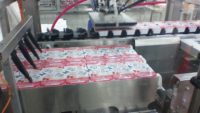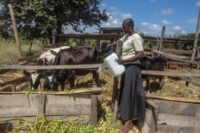As part of our National Dairy Month celebration, Dairy Foods is taking a look at two milk processors and highlighting each one’s unique approach to handling fluid milk.
No two milk processors are alike. Each has its own method to sourcing, processing and marketing milk. Kilby Cream is a small farmstead operation in Maryland. Clover Sonoma is a bigger California dairy that has rebranded itself. Both have a commitment to processing high-quality milk products.
Let’s take a look inside these two unique operations and see what each is bringing to the dairy industry.
Kilby Cream gets fresh
Consumers want local, fresh and minimally processed foods. A dairy farmer in rural Maryland said, ‘I can do that,’ and decided to build a plant to process milk and ice cream.
Bill Kilby’s family has been farming for 100 years. His ancestors had farms in Pennsylvania and North Carolina. In 1961, his parents settled in Cecil County, Maryland. Now Bill and wife Phyllis operate a 400-head dairy farm in Colora, located about an hour northeast of Baltimore.
Their newest venture is dairy processing under the name Kilby Cream. The Kilbys are taking advantage of many of the trends affecting all food processors: consumer demand for healthy and minimally processed foods purchased from local sources who are transparent about their business practices. Read more about how this company is keeping it fresh here.
Clover Sonoma goes non-GMO
The Petaluma-based company's seamless melding of old and new has led to a major change in how the dairy goes to market. Last year, President and CEO Marcus Benedetti committed to processing Non-GMO Project Verified conventional milk.
The first half-gallon jugs came off the line last February. The transition will be completed by the end of 2018.
President and CEO Marcus Benedetti called it a financial gamble yet said ‘it’s the right thing to do for a whole host of reasons.’
In rolling out the new line, the company cited Consumer Reports which reported that 72% of Americans place importance on avoiding GMOs in products they purchase. And the dairy points to another figure from Packaged Facts that the non-GMO market is expected to grow 15% per year globally from 2014 to 2019. Read more about the company's bold step into non-GMO milk here.




